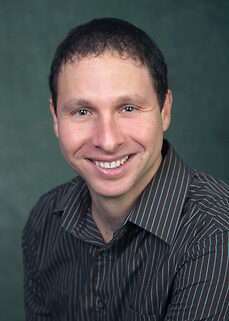[Seminar] "Rheology of dense ellipsoidal grains" by Prof. Ben Nadler

Date
Location
Description
Abstract:
Keywords: dense granular flow, ellipsoidal grains, shape anisotropy
Ellipsoidal grains show a complex microscopic behavior associate with their ability to orient and align
with respect to each other and the flow. These additional microscopic degree of freedom is an evolving
property that gives rise to a complex anisotropic rheological response. Available continuum constitutive models of dense granular materials typically only consider grain size while ignoring grain shape, orientation and alignment and their effect on the rheological response.
This presentation discusses a simple generalization of the inertia rheology [1] to ellipsoidal grains. A
continuum model that explicitly accounts for the grain shape and the microscopic arrangement is proposed based on physical observations that are used to motivate the mathematical construction of the model. The model consists of a constitutive law that relates the grain shape, microstructure arrangement and the flow to the developed stresses and an evolution law for the microstructure arrangement.
Limited meaningful experimental and micro-scale simulation data on the mechanics of ellipsoidal
grain is available in the literature, which mainly consists of measurements of simple shear (Couette)
flow [2, 3]. Available data is used to determine the model parameters and to investigate its performance.
Comparison with micro-scale Discrete Element Method simulations shows that the model captures the
complex mechanical response that is induced by the grain shape and the microstructure arrangement when subjected to simple shear.
References
[1] P. Jop, Y. Forterre and O. Pouliquen, A constitutive law for dense granular flows, Nature, 441:727-
730, 2006.
[2] B. Nadler, F. Guillard and I. Einav, Kinematic Model of Transient Shape-Induced Anisotropy in
Dense Granular Flow, Phys. Rev. Lett., 120: 198003, 2018
[3] D. Nagy, P. Claudin, T. Borzs ¨ onyi and E. Somfai, Rheology of dense granular flows for elong ¨ ated particles, Phys. Rev. E, 96: 062903, 2017
Biography:
Degree/ Diploma, Field, Institution, Year Granted
BS Mechanical Engineering Technion-Israel Institute of Technology 1999
MS Mechanical Engineering Technion-Israel Institute of Technology 2002
PhD Mechanical Engineering University of California – Berkeley 2006
Academic Appointments
Assistant Professor, Mechanical Engineering, University of Alberta, 2006 - 2010
Assistant Professor, Mechanical Engineering, University of Victoria, 2010 – 2013
Associate Professor, Mechanical Engineering University of Victoria, 2013 - present
Visiting Professor, University of Sydney, Center in Geomechanics and Mining Materials, 2016
Major Field(s) of Scholarly, Professional and Research Interests
Research interests are theoretical and computational aspects of modern continuum
mechanics and constitutive modeling. Of main interest are granular physics, elastic and
inelastic response of soft materials and biomechanics.
Intra-Group Category
Subscribe to the OIST Calendar: Right-click to download, then open in your calendar application.



